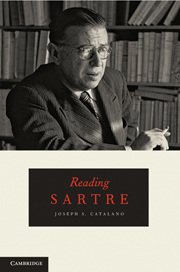2 - Saint Genet: Actor and Martyr
Published online by Cambridge University Press: 05 June 2012
Summary
At seven years of age the orphaned Jean Genet is placed in a Morvan peasant home by The National Foundling Society. The government action is normal and Genet is grateful for his adoption. True, he is brought up to say, “Thank you!” for everything; but he is not resentful. He is a good boy and at the head of his classes. He is said to be pious. Moreover, he wishes to please, for he has a dream: He will work, save, own things, and be a respected peasant like his foster parents. There is more. This orphaned child wants to be a saint. How are the dreams of having property and of being a saint related? No doubt, the young Genet has not troubled himself about such matters. Still, he clearly learned respect for property from his foster parents, and, perhaps, one can say that he substituted saintly election for the lost relationship to his real parents.
At first, adoption allowed Genet to live as happily as any other child. He seems to have regarded his orphaned former life as merely another childhood circumstance such as the color of his hair or his height. In the language of Being and Nothingness, we might say that Genet “passed through” his early orphaned state somewhat as a lame child may run and limp happily with friends. In Sartre's terms, the young Genet is “innocent.” Still, innocence is fragile: “Everything comes to us from others, even innocence” (6).
- Type
- Chapter
- Information
- Reading Sartre , pp. 21 - 42Publisher: Cambridge University PressPrint publication year: 2010

